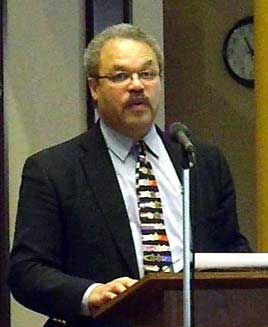 Lew Frederick, Oregon State Representative Lew Frederick, Oregon State Representative |
Electricity, gas, water…and high-speed Internet in your home: each of these services meets a basic need. And if you feel that going online is not as important as the other three, you might want to reconsider.
"Frankly access to the Internet is not a luxury any more," says state Rep. Lew Frederick. "It's a necessity – maybe not quite as much as water or power, but it's a utility." The Skanner News Video: Why do Americans Hate Broadband
Frederick once decided to count the number of advertised jobs that ask for resumes to be sent by email. "Between 80 and 90 percent required an emailed resume – and that was six or seven years ago," he says. "In today's world, if you want to apply for a job you will have to go online. It's not about heading out and knocking on doors – that's not the way it works any more. And this isn't just about getting jobs – you have to go online for just about everything now."
Anyone who has high speed Internet access at home will recognize this truth. Yes, we go online for entertainment. But we also use it to pay bills, make appointments, take classes, reserve library books, find information and talk to people near and far. More importantly, because we use it to buy, sell, market and recruit all kinds of goods and services, the Internet drives our economy –locally and nationally.
| Compare Internet, Cell phone and Cable Prices in your area |
Since 1999, city officials and advocates, such as the founders of the Portland Telco project, have been looking for a way to provide fast, reliable, affordable Internet service to everyone in the city. Significant progress was made, only to be derailed by funding problems and disagreement over government's role.
In the meantime, decisions made in Washington DC by the Federal Communication Commission – have changed the playing field.
Mary Beth Henry, deputy director of Portland's office of Cable Communications and Franc hise Management, said the latest Broadband planning effort will bring industry, government and citizens together to find solutions. "We need to make sure our infrastructure keeps up or Portland will become a 'has been'," she said. "There may not be one grand solution, but there may be a bunch of smaller solutions that each deal with a piece of this issue."
hise Management, said the latest Broadband planning effort will bring industry, government and citizens together to find solutions. "We need to make sure our infrastructure keeps up or Portland will become a 'has been'," she said. "There may not be one grand solution, but there may be a bunch of smaller solutions that each deal with a piece of this issue."
The Challenge of Inequality
One of the dangers we face is the crippling inequality that will result from leaving large groups of people behind. A study by the Mt Hood Regulatory Commission, 'Your Vo!ce' found that 28 percent of Portlanders don't have high-speed Internet access at home – largely because they can't afford it. Of those Portlanders who earn less than $30,000 a year, 47 percent lack high speed Internet access, compared to just 5 percent of those who earn more than $60,000 a year.
"I thought by 2011 we'd have accessible Internet for $5 to $10 a month,
but that hasn't happened in America," says Craig Fondren, director of Sabin Community Development Corporation and a longtime advocate for universal access.
"To get high-speed Internet today, costs $50 or $60 a month or even higher. So if you're a single mother with three kids, you're going to think about transportation, housing and childcare, and you're probably not able to afford to get online."
This 'digital divide' handicaps low-income students who can't go online to do their homework. It handicaps adult jobseekers: two in five can't search for work online from home.
"If we are going to say we are the city of the future, and if we are going to say we are green and sustainable and bike friendly, then all of our citizens have to have that full communication," says Fondren. "If not, then we are not living up to that message.
We have to push this as a city, as a state. It's not just important; it's necessary if we are to be a city of the future."
Many African Americans do have access to high-speed Internet, either on their cell phones or on home computers. Black themes often dominate on Twitter, and music videos feature thousands of Black musicians. But because people of color are more likely to be poor, too many still lack high-speed Internet.
According to the study, Spanish-speaking families and others who don't speak English at home are among the most disadvantaged. That's partly because these groups are most likely to feel that being online has little to offer them.
"We need to make it affordable for everyone," says Mary Beth Henry. "And we have to show people how it can be useful to them."
NW Region Seeks to Expand High-Speed Internet: Part One






















































































































































































































































































































